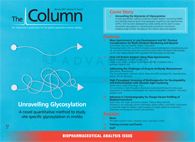New Vaccine Quality Assessment Assay Developed Using Conformation-Dependent Antibodies Coupled to SE-HPLC
Researchers have developed and validated a stability- and potency-indicating assay protocol for high-throughput quality assessment of vaccines consisting of recombinant virus- “like” particles (VLPs) using conformation-dependent antibodies coupled to size-exclusion high performance liquid chromatography (SE-HPLC).
Photo Credit: Kateryna Kon/Shutterstock.com

Researchers have developed and validated a stability- and potency-indicating assay protocol for high-throughput quality assessment of vaccines consisting of recombinant virus- “like” particles (VLPs) using conformation-dependent antibodies coupled to size-exclusion high performance liquid chromatography (SE-HPLC) (1).
Traditional vaccines utilizing attenuated or inactivated infectious agents often induce unpleasant side effects in their recipients, necessitating research into alternatives, and leading to the development of “subunit vaccines”. These vaccines do not contain live components of the pathogen, but instead contain recombinant protein antigens. Although cheaper to produce and safer to use than conventional vaccines, the recombinant proteins contained within these vaccines can suffer from poor immunogenicity and therefore require extensive testing to ensure effectiveness.
Subunit vaccines have been developed against viruses such as human papillomavirus (HPV), which is the most common cause of viral infections of the genital tract. Strains of HPV can be cancer causing, and have been found to be responsible for approximately 70% of cervical cancer and precancerous cervical lesions (2). The HPV vaccine is quadrivalent containing four types of non-infectious recombinant VLPs, however, currently ELISA remains the only approved in vitro potency testing assay for this vaccine. Despite good reproducibility and specificity, the protocol is time consuming, labour intensive, and sample volume demanding. These limitations raised the need for a more economic and industry friendly approach for quality assessment and batch release of HPV vaccine preparations.
Researchers developed an alternative method for vaccine evaluation using vacuum-immunoaffinity extraction (IAE) columns for sample preparation and IAE coupled to SE-HPLC for the determination of VLPs. The results were compared to the conventional ELISA assay and excellent specificity, sensitivity, and precision were found. The IAEâSEâHPLC assay protocol was demonstrated to be superior to ELISA, extensively reducing analysis time and cost.
References
- M.M. Mostafa et al., J. Chromatogr. B1032, 211–217 (2016).
- WHO fact sheet, Human Papillomavirus (HPV) and Cervical Cancer Fact SheetNo380, 2015 http://www.who.int/mediacentre/factsheets/fs380.

Characterizing Plant Polysaccharides Using Size-Exclusion Chromatography
April 4th 2025With green chemistry becoming more standardized, Leena Pitkänen of Aalto University analyzed how useful size-exclusion chromatography (SEC) and asymmetric flow field-flow fractionation (AF4) could be in characterizing plant polysaccharides.
Investigating the Protective Effects of Frankincense Oil on Wound Healing with GC–MS
April 2nd 2025Frankincense essential oil is known for its anti-inflammatory, antioxidant, and therapeutic properties. A recent study investigated the protective effects of the oil in an excision wound model in rats, focusing on oxidative stress reduction, inflammatory cytokine modulation, and caspase-3 regulation; chemical composition of the oil was analyzed using gas chromatography–mass spectrometry (GC–MS).












